惠特曼诗歌分析A noiseless patient spider
- 格式:ppt
- 大小:336.00 KB
- 文档页数:12
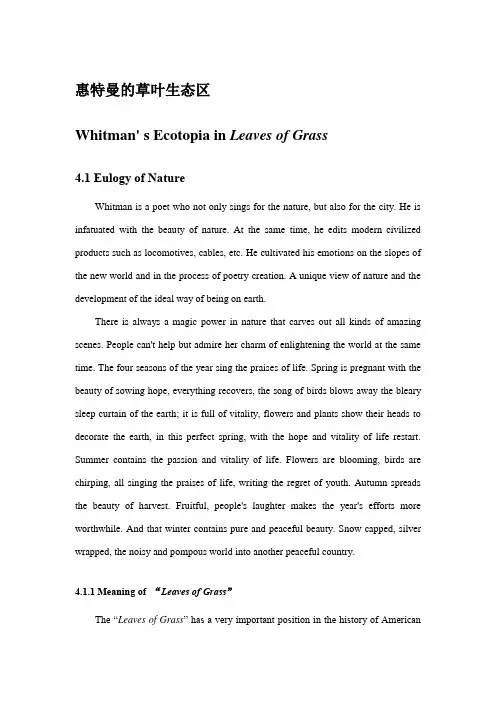
惠特曼的草叶生态区Whitman' s Ecotopia in Leaves of Grass4.1 Eulogy of NatureWhitman is a poet who not only sings for the nature, but also for the city. He is infatuated with the beauty of nature. At the same time, he edits modern civilized products such as locomotives, cables, etc. He cultivated his emotions on the slopes of the new world and in the process of poetry creation. A unique view of nature and the development of the ideal way of being on earth.There is always a magic power in nature that carves out all kinds of amazing scenes. People can't help but admire her charm of enlightening the world at the same time. The four seasons of the year sing the praises of life. Spring is pregnant with the beauty of sowing hope, everything recovers, the song of birds blows away the bleary sleep curtain of the earth; it is full of vitality, flowers and plants show their heads to decorate the earth, in this perfect spring, with the hope and vitality of life restart. Summer contains the passion and vitality of life. Flowers are blooming, birds are chirping, all singing the praises of life, writing the regret of youth. Autumn spreads the beauty of harvest. Fruitful, people's laughter makes the year's efforts more worthwhile. And that winter contains pure and peaceful beauty. Snow capped, silver wrapped, the noisy and pompous world into another peaceful country.4.1.1 Meaning of “Leaves of Grass”The “Leaves of Grass” has a very important position in the history of Americanpoetry and even the entire literature. It is a world-renowned masterpiece, and it has created a new era of American national poetry. Even for English poetry as a whole, its influence can be describ ed by the word “revolution”. When the poetry of Longfellow et al. Is still following the European tradition from content to form, the author has made bold innovations in the form of poetry, created a “free verse” form of poetry, broke the traditional poetic rhythm, and broken the sentence. As the basis of the rhythm, the rhythm is free and unrestrained, the ocean is wild and unrestrained, and it has the momentum and the all-inclusive capacity.Acura democracy and freedom are the main themes of The Blade of Grass. In “Song of Freedom”, the poet solemnly declared: “I utter the most primitive password, and I send a signal of democracy.” In “Knock! Knock it! War Drums!” In this poem, the poet fully reflects the fighting spirit of the federal military and civilians in order to smash slavery and fight for democracy: “Don't negotiate, don't stop, because of others' advice, ignore the cowardly, ignore the crying or praying People; ah, the bugle is blowing so loudly.” In“For You, Democracy”, the poet wrote:“Come, I want to create a nation where the sun shines on ... For you, democracy Oh, I sing these songs in a trembling voice. ”The poet sees the United States as “ the land of democracy.”Human equality is also a concern of the Blade of Grass. In Beginnock, the poet enthusiastically wrote, “Ah. Such a theme is equal! This sacred Pinger noun!”According to the poet, in this world, nations are large and small, regardless of race, They should all be equal. “I am a member of many nations. There is no difference between the largest and the smallest.” “All men born are my brothers, all women are my sisters, and my lover.”“Leaves of Grass” also praises life and praises ordinary workers. There are two poems in “Modern Times”: “There is nothing more godly in the universe th an humanbeings. How majestic and how beautiful.” In “Song of Myself”, the poet generally expressed the image of ordinary Americans. At the beginning of the poem. The poet wrote: “I praise myself for being self-sufficient, and you should also bear what I a ssume, because every atom that belongs to me also belongs to you.” The poet regards himself as an ordinary member of the people. Acclaimed these ordinary people with enthusiasm. It is a typical feature of Romanticism to use rich imagination in his works. Whitman's imagination has its own unique features. For example, the illusion of the gunner describes the illusion of the gunner in a war, which is a scene of fierce fighting: “I hear the sound of different missiles, the short burst of rifle warheads, I see the shell explosion, resulting in clouds, and I hear the sharp sound of the cannon bullets passing by.”Since it's in the battlefield, it's bound to bleed, but the gunner said “I don't pay attention”. Even though there was a lot of noise around, the gunner heard the sound of good news accurately. The poem greatly inspired morale and called on the soldiers to drain the last drop of blood for the country. “The ox tamer”depicts a ox tamer who is good at taming bulls.“Without a bullwhip, he would jump up and down to the angry field of the little cattle fearlessly, stare at him, and the angry cattle would shake his head high and raise it.”The ox tamer is a real master. Although he is “reticent and ignorant of words”, the poet only admires and praises him. When the last lilac blooms in the courtyards, the whole chapter uses symbolic techniques to connect the lilac with President Lincoln.4.1.2 Beauty of NatureThere are a great number of lines in Whitman’S poems illustrating the beamy of nature.In the poem “I Saw in Louisiana a Live-0ak Growing”.he writes:“I saw in Louisiana a live—oak growing,All alone stood it and the moss hung down from the branches,Without any companion it grew there uttering joyous leaves of dark green,And its look, rude, unbending. lusty,made me think of myself,... ... ... ... ...... ... ... ... ...For all that,and thouth the live—oak glistens there in Louisiana solitary in a wide fiat space,Uttering joyous leaves all its life without a friend a lover near.”In the poem “I Saw in Louisiana a Live-0ak Growing”, Whitman is not only moved by its beauty as a tree, but also by its brave and calm quality. It bravely faces any difficulties in life and enjoys happiness with a calm mind, so it shines brilliantly in the poet's eyes. The oak was impressive, and he took one of its twigs with him for a long time to feel as much as he could.ow very well I could not.” From the description of a small tree, the beauty of nature is vividly reflected.In addition, animals often appear in his poems. He wrote for birds, insects and all the animals he met in his life. "It is not because the tortoise is nothing else that the ox is not worth shaking off its chains or stopping in the shade of the tree. / and Jay in the forest has studied its range, but its vibrato is very good for me. In the poem about animals, a special spider caught his attention. In “A Noiseless Patient Spider”. he wrote: “a silent patient spider / I mark where it is isolated in Cape Lille / mark how to explore the vast empty environment / it launches.” Filaments, filaments, filaments, pulled from itself / never honed them, never tired to speed them up . In Whitman's eyes, there are countless poems touching animals, which are usually symbols of free exploration and calm.In a word, Whitman loves everything in nature. He writes for an oak—tree, forthe leaves, for the river, for the ocean, for colorful flowers, ..., for everthing in nature.4.2 Whitman' s Views on Ecological ExistenceWhitman perfectly combines nature with city or culture. From time to time in his poems, he weaves nature into culture, or weaves nature into culture. He realized the close relationship between the two. However, with the process of industrialization and urbanization in modern society, people began to be accustomed to using high technology and science to solve all the problems that undoubtedly separated people from nature and alienated people from nature. However, as food, clothes and sheds, nature has always played a unique role in the whole process of human civilization. People can't live without nature, just like fish can't live without water. he believes that returning to nature and realizing the harmonious relationship between civilization and nature.4.2.1 Going Back to NatureWhitman wanders in the new world, exhausted in body and mind, writing, climbing mountains and mountains, crossing rivers and rivers, wandering in grasslands and forests, wandering on the sea. In his eyes, there are some things in nature that are beautiful or charming to him. First of all, charm comes from the beauty of nature. As a child, Whitman has a special experience of close contact with nature and frequent observation of natural changes, so he can communicate with nature and perceive the beauty of nature with his keen senses. Therefore, as a poet, Whitman enjoys the profundity and profundity of nature more deeply than any other poet. He expresses his appreciation for almost everything in nature, from beautiful scenery to seasonal changes, changes in the ocean, and the living conditions of creatures in nature. He devotes himself to nature and changes his love for nature into immortalityPsalm. So he implies that nature is something beneficial to human beings; in his poems, the encouragement of returning to nature is repeated everywhere.At the same time, in the process of observing and observing nature, he thought about many important things in life and culture. It seems that all things in nature and poetic imagination are integrated into his poetry. For poet, nature is not only the place where he said to understand the profound philosophy of life, but also a source that can understand the philosophy of life, which is released in his mind Enlightening, the poet has millions of writing themes. Although nature is mysterious, poet is willing to explore its secrets and appreciate its glory. He often invites anyone to join him to enjoy the beautiful scenery and communicate with nature. In a sense, he represents everyone in his poetry.such as Whitman said, “Whoever you ale come travel with me!\Traveling with me you find what never tires!”, 'The press of my foot to the earth springs a hundred affections\Of men that live among cattle or taste of the ocean or woods.”In Whitman’s poem, he is always combined with nature, just like dust or grass, but he is still with human beings, because human beings cannot survive without nature. Nature is good for human body and mind. It embodies Whitman's call for modern people to return to nature. He agrees with nature so that people can easily forget everything. Troubles from human society, by doing so, the troubled mind will be comforted by the magic of nature.4.2.2 Advocacy of the Natural Way of ExistenceIn addition to his praise of the natural beauty, Whitman also pays close attention to the psychological state of human beings. From the spiritual dimension of human existence, he can deeply understand many poems in “Leaves of Grass”.Under the background of the crisis of the spiritual world in the 21st century, it isof far-reaching significance to explore these problems. In recent years, great changes have taken place around us. On the one hand, with the development of science and technology, productivity has been improved, and the efficiency of enterprises has been improved. At the same time, it is also constantly improving, causing serious environmental deterioration and ecological crisis. On the other hand, human beings are gradually away from it Nature, on the surface of the booming industrial and commercial world, some things begin to destroy and threaten nature and its residents. Various kinds of pollution and environmental degradation have brought different crises in different fields, which are rooted in human's greedy outlook on life and material. Driven by greedy desire, human seems to lose their sense, thus breaking the balance between the material world and the spiritual world, It leads to mental problems ranging from suicide to insanity.As for the spiritual or spiritual problems of human beings, Whitman wisely provided human beings with his idea of living in a natural way on earth. Of course, his inspiration for the balanced state of mind still comes from nature. When he travels around, he meditates at the same time so that he has people on earth, and one of the most prominent principles of such philosophy is that the natural way absorbs a large number of philosophies of life or existence.As he said:“I think I could turn and live with animals,they are so placid and self-contain’d,I stand and look at them long and long.... ... ... ... ...... ... ... ... ...No one kneels to another,nor to his kind that lived thousands of years ago,No one is respectable or unhappy over the whole earth.”In this poem, he wrote praises for animals and plants. They are always satisfiedwith what they have and where they are. They bravely accept the happiness and hardship in life. It seems that they know the general order of nature, usually keep a calm state of mind and never worry about anything. What modern people do in society is in sharp contrast to this philosophy of existence.In short, Whitman does not support people to live in a tense state of mind, but advocates a natural way of life. In his opinion, people should do what they are good at, keep a peaceful attitude and live a life of self satisfaction, instead of greedily pursuing many material things.。
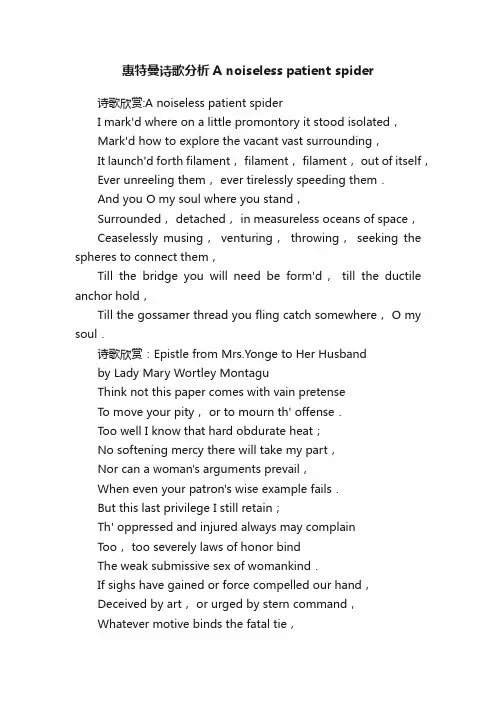
惠特曼诗歌分析A noiseless patient spider诗歌欣赏:A noiseless patient spiderI mark'd where on a little promontory it stood isolated,Mark'd how to explore the vacant vast surrounding,It launch'd forth filament, filament, filament, out of itself,Ever unreeling them, ever tirelessly speeding them.And you O my soul where you stand,Surrounded, detached, in measureless oceans of space,Ceaselessly musing,venturing,throwing,seeking the spheres to connect them,Till the bridge you will need be form'd,till the ductile anchor hold,Till the gossamer thread you fling catch somewhere, O my soul.诗歌欣赏:Epistle from Mrs.Yonge to Her Husbandby Lady Mary Wortley MontaguThink not this paper comes with vain pretenseTo move your pity, or to mourn th' offense.Too well I know that hard obdurate heat;No softening mercy there will take my part,Nor can a woman's arguments prevail,When even your patron's wise example fails.But this last privilege I still retain;Th' oppressed and injured always may complainToo, too severely laws of honor bindThe weak submissive sex of womankind.If sighs have gained or force compelled our hand,Deceived by art, or urged by stern command,Whatever motive binds the fatal tie,The judging world expects our constancy.Just heaven!(for sure in heaven does justice reign,Though tricks below that sacred name profane)To you appealing I submit my cause,Nor fear a judgment from impartial laws.All bargains but conditional are made;The purchase void, the creditor unpaid;Defrauded servants are from service free;A wounded slave regains his liberty.For wives ill used no remedy remains,To daily racks condemned, and to eternal chains.From whence is this unjust distinction grown?Are we not formed with passions like your own? Nature with equal fire our souls endued,Our minds as haughty, and as warm as our blood;O'er the wide world your pleasures you pursue,The change is justified by something new;But we must sigh in silence——and be true.Our sex's weakness you expose and blame(Of every prattling fop the common theme),Yet from this weakness you suppose is due Sublimer virtue that your Cato knew.Had heaven designed us trials so severe,It would have formed our tempers then to bear.And I have borne (oh what have I not borne!)The pang of jealousy, the insults of scorn.Wearied at length, I from your sight remove,And place my future hopes in secret love.In the gay bloom of glowing youth retired,I quit the woman's joy to be admired,With that small pension your hard heart allows,Renounce your fortune, and release your vows.To custom (though unjust) so much is due;I hide my frailty from the public view.My conscience clear, yet sensible of shame,My life I hazard, to preserve my fame.And I prefer this low inglorious stateTo vile dependence on the thing I hate——But you pursue me to this last retreat.Dragged into light, my tender crime is shown And every circumstance of fondness known.Beneath the shelter of the law you stand,And urge my ruin with a cruel hand,While to my fault thus rigidly severe,Tamely submissive to the man you fear.This wretched outcast, this abandoned wife,Has yet this joy to sweeten shameful life:By your mean conduct, infamously loose,You are at once my accuser and excuse.Let me be damned by the censorious prude (Stupidly dull, or spiritually lewd),My hapless case will surely pity findFrom every just and reasonable mind.When to the final sentence I submit,The lips condemn me, but their souls acquit.No more my husband, to your pleasures go,The sweets of your recovered freedom know.Go: court the brittle friendship of the great,Smile at his board, or at his levee wait;And when dismissed, to madam's toilet fly,More than her chambermaids, or glasses, lie,Tell her how young she looks, how heavenly fair,Admire the lilies and the roses there.Your high ambition may be gratified,Some cousin of her own be made your bride,And you the father of a glorious raceEndowed with Ch——l's strength and Low——r's face.诗歌欣赏:Epitaph Xby Thomas HeiseMy birthright I have traded for a petal dressand a summer eulogy. I have pawned my soulfor this opal ring, the color of a pale, taxidermied eye.If I could carry calla lilies on my shoulder once morelike an umbrella in daylight, I would lean themon the cemetery gate and sleep until the groundskeeper found me.For some of us, beauty is carcinoma.The saint‘s stigmata is god’s rose, bestowedfor forgoing a human lover, who will, of course, die.I died last year. My mother made her tears into crystalearrings and clipped them to my ears.“Son, you willpay for your sin,“ my father spoke from his throne of glass.Stars burn a sharp, white nacre until they evaporate.The moon‘s flamingo unfolds her iodine wings ov er the broken city.My necropolis. My teeth are the fruit of your olive tree.诗歌欣赏:Buying Stockby Denise Duhamel"……The use of condoms offers substantial protection, but does notguarantee total protection and that whilethere is no evidence that deep kissing has resulted intransfer of the virus, no one can say that such transmission would be absolutely impossible."——The Surgeon General, 1987I know you won't mind if I ask you to put this on.It's for your protection as well as mine——Wait.Wait. Here, before we rush into anythingI've bought a condom for each one of your fingers.And here——just a minute——Open up.I'll help you put this one on, over your tongue.I was thinking:If we leave these two rolled, you can wear themas patches over your eyes. Partners have been known to cry,shed tears,bodily fluids,at all this trust,at even the thoughtof this closeness..诗歌欣赏:Epithalamiumby Matthew RohrerIn the middle garden is the secret wedding,that hides always under the other oneand under the shiny things of the other one. Under a treeone hand reaches through the grainy dusk toward another.Two right hands. The ring is a weed that will surely die.There is no one else for miles,and even those people far away are deaf and blind.There is no one to bless this.There are the dark trees, and just beyond the trees.诗歌欣赏:Barrio with Sketchy Detailby Andrea WerblinExcept for the chickens humming to each other,making themselves look boneless in the dirt,I want no memory of this place.I will leave gingerly.I will leave strung out.I will leave rocking on my heels in unbearable heat.the Mexican girls still faking and mourning Selena from their perfect cement stoops,not yet sworn to the anger hangingfrom their papas' mouths like cigarettes.I will leave stunned, from across the room.I will leave by instinct, my tongue intact.I will leave understanding itwas always coming, before that night, even before we met. Marta will stand quiet, a glyph,Pedro offer beer in cups. We'll sit.When I leave, the sky will be a gouache of scratches,the morning sluggish, a cactus flowering.Or I will leave in blistered dark. It will still be true.。
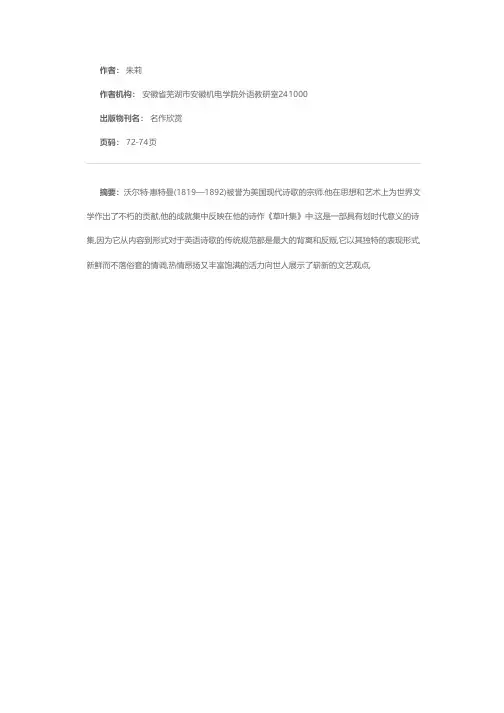
作者: 朱莉
作者机构: 安徽省芜湖市安徽机电学院外语教研室241000
出版物刊名: 名作欣赏
页码: 72-74页
摘要:沃尔特·惠特曼(1819—1892)被誉为美国现代诗歌的宗师.他在思想和艺术上为世界文学作出了不朽的贡献,他的成就集中反映在他的诗作《草叶集》中.这是一部具有划时代意义的诗集,因为它从内容到形式对于英语诗歌的传统规范都是最大的背离和反叛,它以其独特的表现形式,新鲜而不落俗套的情调,热情昂扬又丰富饱满的活力向世人展示了崭新的文艺观点,。
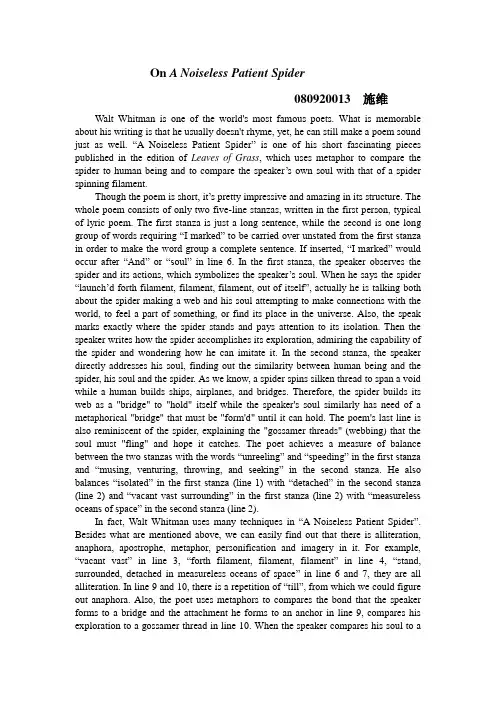
On A Noiseless Patient Spider080920013 施维Walt Whitman is one of the world's most famous poets. What is memorable about his writing is that he usually doesn't rhyme, yet, he can still make a poem sound just as well. “A Noiseless Patient Spider”is one of his short fascinating pieces published in the edition of Leaves of Grass, which uses metaphor to compare the spider to human being and to compare the speaker’s own soul with that of a spider spinning filament.Though the poem is short, it’s pretty impressive and amazing in its structure. The whole poem consists of only two five-line stanzas, written in the first person, typical of lyric poem. The first stanza is just a long sentence, while the second is one long group of words requi ring “I marked” to be carried over unstated from the first stanza in order to make the word group a complete sentence. If inserted, “I marked” would occur after “And” or “soul” in line 6. In the first stanza, the speaker observes the spider and its actions, which symbolizes the speaker’s soul. When he says the spider “launch’d forth filament, filament, filament, out of itself”, actually he is talking both about the spider making a web and his soul attempting to make connections with the world, to feel a part of something, or find its place in the universe. Also, the speak marks exactly where the spider stands and pays attention to its isolation. Then the speaker writes how the spider accomplishes its exploration, admiring the capability of the spider and wondering how he can imitate it. In the second stanza, the speaker directly addresses his soul, finding out the similarity between human being and the spider, his soul and the spider. As we know, a spider spins silken thread to span a void while a human builds ships, airplanes, and bridges. Therefore, the spider builds its web as a "bridge" to "hold" itself while the speaker's soul similarly has need of a metaphorical "bridge" that must be "form'd" until it can hold. The poem's last line is also reminiscent of the spider, explaining the "gossamer threads" (webbing) that the soul must "fling" and hope it catches. The poet achieves a measure of balance between the two stanzas with the words “unreeling” and “speeding” in the first stanza and “musing, venturing, throwing, and seeking” in the second stanza. He also balances “isolated” in the first stanza (line 1) with “detached” in the second stanza (line 2) and “vacant vast surrounding” in the first stanza (line 2) with “measureless oceans of space” in the second st anza (line 2).In fact, Walt Whitman uses many techniques in “A Noiseless Patient Spider”. Besides what are mentioned above, we can easily find out that there is alliteration, anaphora, apostrophe, metaphor, personification and imagery in it. For example, “vacant vast”in line 3, “forth filament, filament, filament”in line 4, “stand, surrounded, detached in measureless oceans of space”in line 6 and 7, they are all alliteration. In line 9 and 10, there is a repetition of “till”, from which we could figure out anaphora. Also, the poet uses metaphors to compares the bond that the speaker forms to a bridge and the attachment he forms to an anchor in line 9, compares his exploration to a gossamer thread in line 10. When the speaker compares his soul to aperson in the second stanza, here the poet uses personification. Besides, imagery is one typical technique used by Walt Whitman in this poem. For instance, in the first line, “a noiseless patient spider”brings the readers pictures of small, perfectly still, spiders sitting on their perfect webs for days and days at a time, completely unmoving, no sign of life at all. Then the description of the spider’s motionlessness and isolation gives the readers an idea that the speaker feels alone in the world. Moreover, the image of the “vacant vast surrounding”hints at the speaker’s possible doubt in the meaning of life and his feeling of loneliness and isolation from the rest of the world or his inability to connect with others.After reading the poem, it’s not difficult for the reader to find from the words “noiseless”and “patient”used by the poet to describe the spider that the speaker admires the qualities possessed by the spider. In “A Noiseless Patient Spider”, the poet depicted the quest or exploration of the spider, symbolizing people’s exploration for meaning and knowledge in the vastness of the universe. It is obvious that the speaker admires the courage of the spider to venture forth alone into unknown territory, the patience of it to build a plexus that links one stopping place to the next, and the perseverance of it to carry until the gossamer thread connects to a goal. Meanwhile, that is also what the speaker as well as the reader needs to learn from the spider. The spider is “patient”. The spider is “noiseless”. The spider keeps on trying, without complaint.In a word, “A Noiseless Patient Spider”is an excellent work, which could be considered as “small in theme” in the first stanza at the first glance, yet containing a “sweep of the universe” after carefully analyzing in the whole.。

《生命的召唤》-----阿迪斯·惠特曼《生命的召唤》-----阿迪斯·惠特曼记得小时候,我住在加拿大挪瓦斯科塔乡下时,发生过一件事。
邻居一位太太去世,鳏夫整日酗酒,根本不管孩子。
村中有位寡妇把那家的一个男孩带回自己家。
她很贫穷,又没上过学,但却竭尽全力照顾这浑身发抖、性情孤僻的孩子。
他好象转眼间变了,个子长高了,性格也开朗了。
但是我们和他不熟,谁也不跟他讲话,这使他很自卑。
有一天,他的养母看见我们在玩耍,而那孩子却躲在一边抽泣,没人理睬。
她把他带回屋里,然后对我们大动肝火:“我不准你们这样待他!这孩子也是人。
现在的生活会影响他的一生。
每次我使他稍微抬起头来,你们又把它压下去。
你们不想让他活吗?”许多年过去,我总也忘不了这件事。
它使我第一次领悟到深刻而严肃的人生哲理—─人能成全他人,也能毁弃他人;互相帮助能使人奋发向上,互相抱怨会使人退缩不前。
人与人之间的这种影响,就象阳光与寒霜对田野的影响一样。
每个人都随时发出一种呼唤,促使别人荣辱毁誉,生死成败。
一位作家曾把人生比做蛛网。
他说:“我们生活在世界上,对他人的热爱、憎恨或冷漠,就象抖动一个大蜘蛛网。
我影响他人,他人又影响他人。
巨网振动,辗转波及,不知何处止,何时休。
”有些人专会鼓吹人生没有意义没有希望。
他们的言行使人放弃、退缩或屈服。
这些人之所以如此,可能是因为自己受了委屈或遇到不幸;但不论原因如何,他们孤僻冷淡,使梦想幻灭、希望成灰、欢乐失色。
他们尖酸刻薄,使礼物失值、成绩无光、信心瓦解。
留下来的只是恐惧。
这种人为数不多,但类似的冷言冷语我们都遇到过。
例如,妻子因丈夫身体虚弱,收入微薄,便讥笑他:“你也配做男人?”又如,妻子努力学习烹调,而丈夫的酬答却是“我看你根本不是那块料。
”再如,学生写了一篇有才华有创见的论文,而老师却嫌他书法拙劣,有错别字。
这种人使人觉得没有办法应付人生,从而灰心丧气,自惭形秽,惊慌失措。
而我们可能又会将这种情绪传染给别人。
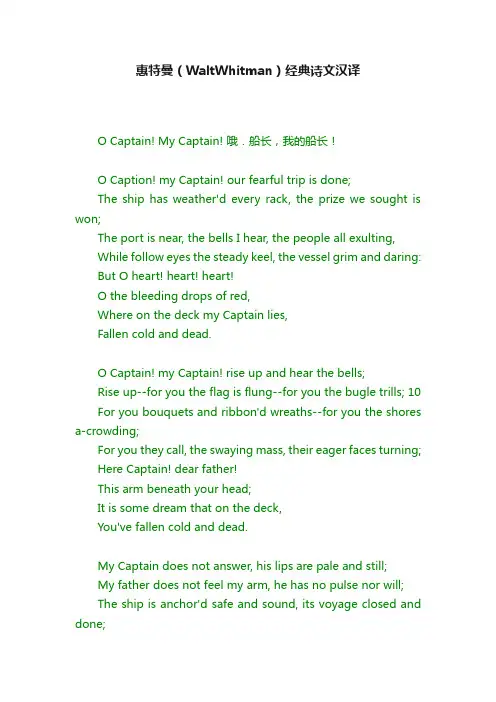
惠特曼(WaltWhitman)经典诗文汉译O Captain! My Captain! 哦.船长,我的船长!O Caption! my Captain! our fearful trip is done;The ship has weather'd every rack, the prize we sought is won;The port is near, the bells I hear, the people all exulting,While follow eyes the steady keel, the vessel grim and daring: But O heart! heart! heart!O the bleeding drops of red,Where on the deck my Captain lies,Fallen cold and dead.O Captain! my Captain! rise up and hear the bells;Rise up--for you the flag is flung--for you the bugle trills; 10 For you bouquets and ribbon'd wreaths--for you the shores a-crowding;For you they call, the swaying mass, their eager faces turning;Here Captain! dear father!This arm beneath your head;It is some dream that on the deck,You've fallen cold and dead.My Captain does not answer, his lips are pale and still;My father does not feel my arm, he has no pulse nor will;The ship is anchor'd safe and sound, its voyage closed and done;From fearful trip, the victor ship, comes in with object won;20Exult, O shores, and ring, O bells!But I, with mournful tread,Walk the deck my Captain lies,Fallen cold and dead.哦.船长,我的船长!哦.船长,我的船长!我们险恶的航程已经告终,我们的船安渡过惊涛骇浪,我们寻求的奖赏已赢得手中。
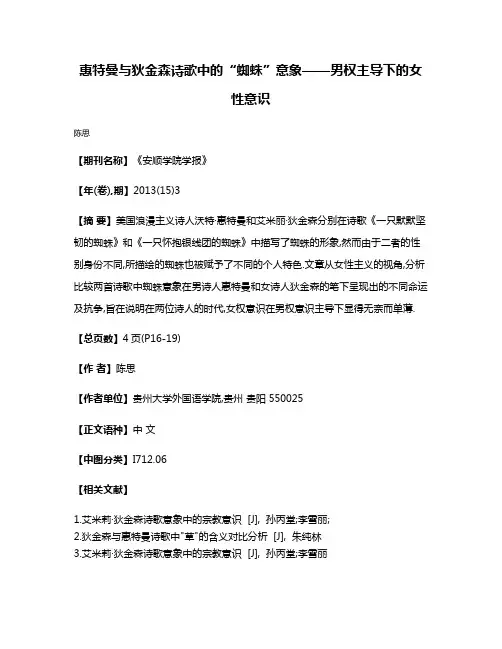
惠特曼与狄金森诗歌中的“蜘蛛”意象——男权主导下的女
性意识
陈思
【期刊名称】《安顺学院学报》
【年(卷),期】2013(15)3
【摘要】美国浪漫主义诗人沃特·惠特曼和艾米丽·狄金森分别在诗歌《一只默默坚韧的蜘蛛》和《一只怀抱银线团的蜘蛛》中描写了蜘蛛的形象,然而由于二者的性别身份不同,所描绘的蜘蛛也被赋予了不同的个人特色.文章从女性主义的视角,分析比较两首诗歌中蜘蛛意象在男诗人惠特曼和女诗人狄金森的笔下呈现出的不同命运及抗争,旨在说明在两位诗人的时代,女权意识在男权意识主导下显得无奈而单薄.【总页数】4页(P16-19)
【作者】陈思
【作者单位】贵州大学外国语学院,贵州贵阳 550025
【正文语种】中文
【中图分类】I712.06
【相关文献】
1.艾米莉·狄金森诗歌意象中的宗教意识 [J], 孙丙堂;李雪丽;
2.狄金森与惠特曼诗歌中"草"的含义对比分析 [J], 朱纯林
3.艾米莉·狄金森诗歌意象中的宗教意识 [J], 孙丙堂;李雪丽
4.论狄金森诗歌中鸟意象的象征意义 [J], LIU Bao-an
5.狄金森诗歌中的意象研究 [J], 梁智砚
因版权原因,仅展示原文概要,查看原文内容请购买。
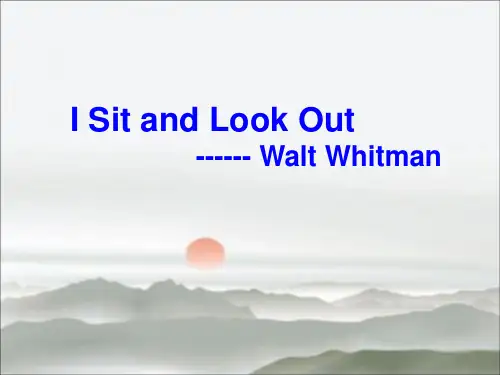
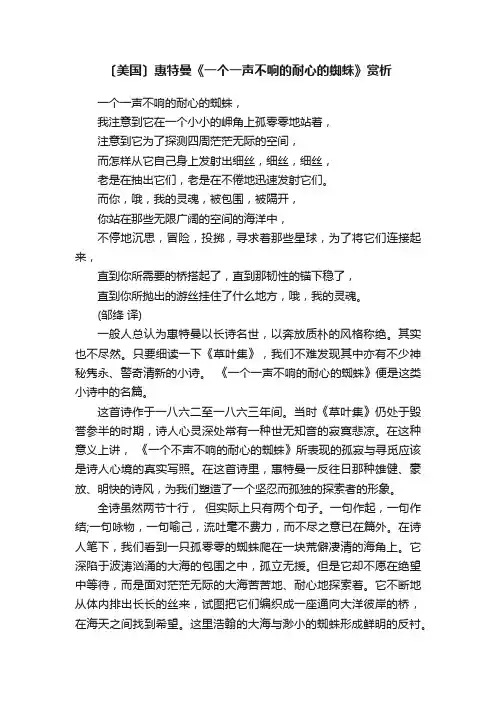
〔美国〕惠特曼《一个一声不响的耐心的蜘蛛》赏析一个一声不响的耐心的蜘蛛,我注意到它在一个小小的岬角上孤零零地站着,注意到它为了探测四周茫茫无际的空间,而怎样从它自己身上发射出细丝,细丝,细丝,老是在抽出它们,老是在不倦地迅速发射它们。
而你,哦,我的灵魂,被包围,被隔开,你站在那些无限广阔的空间的海洋中,不停地沉思,冒险,投掷,寻求着那些星球,为了将它们连接起来,直到你所需要的桥搭起了,直到那韧性的锚下稳了,直到你所抛出的游丝挂住了什么地方,哦,我的灵魂。
(邹绛译)一般人总认为惠特曼以长诗名世,以奔放质朴的风格称绝。
其实也不尽然。
只要细读一下《草叶集》,我们不难发现其中亦有不少神秘隽永、警奇清新的小诗。
《一个一声不响的耐心的蜘蛛》便是这类小诗中的名篇。
这首诗作于一八六二至一八六三年间。
当时《草叶集》仍处于毁誉参半的时期,诗人心灵深处常有一种世无知音的寂寞悲凉。
在这种意义上讲,《一个不声不响的耐心的蜘蛛》所表现的孤寂与寻觅应该是诗人心境的真实写照。
在这首诗里,惠特曼一反往日那种雄健、豪放、明快的诗风,为我们塑造了一个坚忍而孤独的探索者的形象。
全诗虽然两节十行,但实际上只有两个句子。
一句作起,一句作结;一句咏物,一句喻己,流吐毫不费力,而不尽之意已在篇外。
在诗人笔下,我们看到一只孤零零的蜘蛛爬在一块荒僻凄清的海角上。
它深陷于波涛汹涌的大海的包围之中,孤立无援。
但是它却不愿在绝望中等待,而是面对茫茫无际的大海苦苦地、耐心地探索着。
它不断地从体内排出长长的丝来,试图把它们编织成一座通向大洋彼岸的桥,在海天之间找到希望。
这里浩翰的大海与渺小的蜘蛛形成鲜明的反衬。
壮阔者愈见壮阔,渺小者愈见渺小。
仅寥寥几笔,诗人便将深邃悠远的意境、苍凉静谧的气氛和蜘蛛不甘寂寞、努力探索的形象生动地点染出来。
紧接着,诗人笔锋一转,顺势托出全诗主旨,慨叹起自己在人世间的环境来。
在这广阔的世界上他不是同样象只挂在游丝上的蜘蛛吗?他不是同样在执著地追求着希望,寻觅着知音吗?他苦思冥想,不断探索。
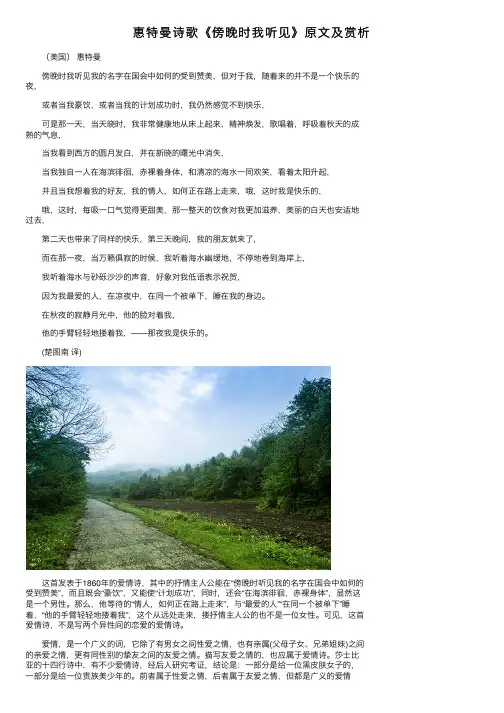
惠特曼诗歌《傍晚时我听见》原⽂及赏析 〔美国〕惠特曼 傍晚时我听见我的名字在国会中如何的受到赞美,但对于我,随着来的并不是⼀个快乐的夜, 或者当我豪饮,或者当我的计划成功时,我仍然感觉不到快乐, 可是那⼀天,当天晓时,我⾮常健康地从床上起来,精神焕发,歌唱着,呼吸着秋天的成熟的⽓息, 当我看到西⽅的圆⽉发⽩,并在新晓的曙光中消失, 当我独⾃⼀⼈在海滨徘徊,⾚裸着⾝体,和清凉的海⽔⼀同欢笑,看着太阳升起, 并且当我想着我的好友,我的情⼈,如何正在路上⾛来,哦,这时我是快乐的, 哦,这时,每吸⼀⼝⽓觉得更甜美,那⼀整天的饮⾷对我更加滋养,美丽的⽩天也安适地过去, 第⼆天也带来了同样的快乐,第三天晚间,我的朋友就来了, ⽽在那⼀夜,当万籁俱寂的时候,我听着海⽔幽缓地,不停地卷到海岸上, 我听着海⽔与砂砾沙沙的声⾳,好象对我低语表⽰祝贺, 因为我最爱的⼈,在凉夜中,在同⼀个被单下,睡在我的⾝边。
在秋夜的寂静⽉光中,他的脸对着我, 他的⼿臂轻轻地搂着我,——那夜我是快乐的。
(楚图南译) 这⾸发表于1860年的爱情诗,其中的抒情主⼈公能在“傍晚时听见我的名字在国会中如何的受到赞美”,⽽且既会“豪饮”,⼜能使“计划成功”,同时,还会“在海滨徘徊,⾚裸⾝体”,显然这是⼀个男性。
那么,他等待的“情⼈,如何正在路上⾛来”,与“最爱的⼈”“在同⼀个被单下”睡着,“他的⼿臂轻轻地搂着我”,这个从远处⾛来,搂抒情主⼈公的也不是⼀位⼥性。
可见,这⾸爱情诗,不是写两个异性间的恋爱的爱情诗。
爱情,是⼀个⼴义的词,它除了有男⼥之间性爱之情,也有亲属(⽗母⼦⼥、兄弟姐妹)之间的亲爱之情,更有同性别的挚友之间的友爱之情。
描写友爱之情的,也应属于爱情诗。
莎⼠⽐亚的⼗四⾏诗中,有不少爱情诗,经后⼈研究考证,结论是:⼀部分是给⼀位⿊⽪肤⼥⼦的,⼀部分是给⼀位贵族美少年的。
前者属于性爱之情,后者属于友爱之情,但都是⼴义的爱情诗。
惠特曼的《草叶集》中有⼀辑《芦笛集》,其中⼀⾸就是《傍晚时我听见》。
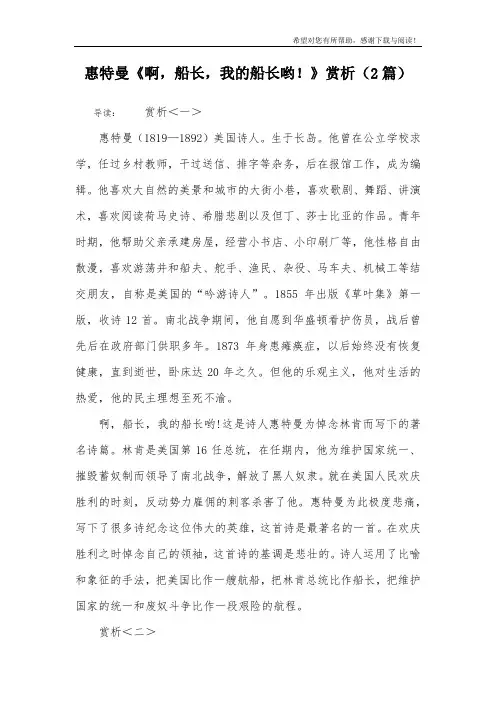
惠特曼《啊,船长,我的船长哟!》赏析(2篇)导读:赏析<一>惠特曼(1819—1892)美国诗人。
生于长岛。
他曾在公立学校求学,任过乡村教师,干过送信、排字等杂务,后在报馆工作,成为编辑。
他喜欢大自然的美景和城市的大街小巷,喜欢歌剧、舞蹈、讲演术,喜欢阅读荷马史诗、希腊悲剧以及但丁、莎士比亚的作品。
青年时期,他帮助父亲承建房屋,经营小书店、小印刷厂等,他性格自由散漫,喜欢游荡并和船夫、舵手、渔民、杂役、马车夫、机械工等结交朋友,自称是美国的“吟游诗人”。
1855年出版《草叶集》第一版,收诗12首。
南北战争期间,他自愿到华盛顿看护伤员,战后曾先后在政府部门供职多年。
1873年身患瘫痪症,以后始终没有恢复健康,直到逝世,卧床达20年之久。
但他的乐观主义,他对生活的热爱,他的民主理想至死不渝。
啊,船长,我的船长哟!这是诗人惠特曼为悼念林肯而写下的著名诗篇。
林肯是美国第16任总统,在任期内,他为维护国家统一、摧毁蓄奴制而领导了南北战争,解放了黑人奴隶。
就在美国人民欢庆胜利的时刻,反动势力雇佣的刺客杀害了他。
惠特曼为此极度悲痛,写下了很多诗纪念这位伟大的英雄,这首诗是最著名的一首。
在欢庆胜利之时悼念自己的领袖,这首诗的基调是悲壮的。
诗人运用了比喻和象征的手法,把美国比作一艘航船,把林肯总统比作船长,把维护国家的统一和废奴斗争比作一段艰险的航程。
赏析<二>1.作者简介惠特曼(1819~1892),19世纪美国杰出的民主主义诗人、出生在纽约附近长岛的一个贫苦农民家庭。
迫于生活很早就出外谋生,当过杂役、木匠、排字工人、新闻工作者和编辑等,他只受过几年初等教育,后来靠自学阅读了大量世界文学名著,但哺育他成长为时代歌手的,主要还是美国沸腾的社会生活。
他的主要作品有《为了你,民主》、《大路之歌》、《今天的军营静悄悄》、《起义之歌》、《啊,法国之星》和散文《民主展望》等。
这些诗歌都编在《草叶集》中,这部优秀诗集成为美国近代文学史上一座光辉的里程碑,是美国民族文学的典范。
自己之歌惠特曼赏析自己之歌是惠特曼的一首超棒的诗呢。
惠特曼这个人可不得了,他就像是诗歌界的一位开拓者。
他生活在那个时代,有着自己独特的对世界、对人的看法,这些都反映在他的诗里。
这首诗啊,特别的地方可多了。
它的风格很自由,就像是一个人在随心所欲地诉说自己的故事。
惠特曼没有被传统诗歌那种严格的格律什么的束缚住。
诗里的意象超级丰富,他会写大自然的各种东西,像河流、树木、动物,这些意象可不是随随便便写的哦。
他把自己和这些自然的元素融合在一起,表达一种人和自然和谐共生的感觉。
从情感方面来说,充满了对自我的肯定和热爱。
在当时的社会背景下,这是一种很先锋的思想。
那时候很多人都被传统的观念所束缚,而惠特曼就大胆地唱出自己的歌,鼓励大家去发现自己的价值。
诗里的语言很直白,但直白中又有着深刻的哲理。
读起来不会觉得晦涩难懂,就像是一个老朋友在跟你聊天,分享他内心深处的想法。
而且这首诗的结构也很独特,不是那种规规矩矩的一段一段的,更像是一条奔腾不息的河流,连绵不断。
惠特曼在诗里不断地切换视角,一会儿从自己的角度,一会儿又像是站在宇宙的高度来看待自己和世界。
这种独特的视角让这首诗充满了奇幻的色彩,每次读都会有新的发现。
他写自己的身体,写自己的灵魂,把这些最真实的东西都毫无保留地展示出来。
这也是他的一种勇气,他想告诉大家,每一个人都是独一无二的,都值得被尊重和热爱。
就像他诗里说的那样,不管你是贫穷还是富有,不管你是什么身份,都有自己的价值。
这种平等、包容的思想在诗里体现得淋漓尽致。
概括来说,自己之歌是一首充满力量、充满爱的诗,它不仅仅是惠特曼的自我表达,更是对所有人的一种鼓舞。
《烦忧》—戴望英文诗歌赏析第一篇:《烦忧》—戴望英文诗歌赏析烦忧——戴望舒说是寂寞的秋的清愁,说是辽远的海的相思。
假如有人问我的烦忧,我不敢说出你的名字,假如有人问我的烦忧。
说是辽远的海的相思,说是寂寞的秋的清愁。
Boring –DaiwangshuIt is called gloomy mood of lone Autumn It is called miss of distant sea If someone ask what's my boringI am afraid of throwing our you name.I am afraid of throwing our you name.If someone ask what's my boringIt is called miss of distant seaIt is called gloomy mood of lone AutumnThis poem comes from Dai's poems《Dai's grass》.As the 1930s Chinese poetry important factionsan important poet.Dai's poems focus on describing the insights of modern life and the emotional experience of the spiritual path.Journey in life, there are sunny like enlightened excited, but also rainy like distressed worries, then, at the moment stagnation worries in mind what the poet called it? Poet does not directly reveal.Clear autumn is a gloomy season , ignited the endless sea of Acacia.It makes people sad to read.The words “boring”,with “distant”, he gave the poet lonely frustration and unable to stop.However, the authors did whim, someone around to ask for your troubles, your sorrow, then how would you answer? Is to come clean, to tell each other all the melancholy of a cavity, or a closely guarded secret, kept it tight? Although the freedom to choose their own, but the face of love your friends ask, can you dumb it? So, how thispsychological hesitantly expressed it? “I can not say your name.” This, “not” it is the exact word to ex press the author's ambivalence, and lead the reader into the endless reverie.The top four, just thirty six words, live draw a deep memory of the author, fierce struggle, the kind of “Unspoken” taste, only meaningful, but also a strong imperative.The top four for the reverse order, rough palindrome poem seems, on reflection is not a simple repetition, but not the style and no substance-like trick.But the author kind of an endless stream of increasingly turbulent thoughts of love inindulgent catharsis.Sentence both as repeated, also deemed the top really, take care of airtight contact.Despite intense and contradictory “ afraid to speak ”.But want to feel hope and pour out so urgent, where the author provides us with a vast imagination, caring people may wish to make an emotional fugue there.The poem of “ Qingchou” as knot, but just to express a mature thinker type of language to express their often complex and unusual state of mind.第二篇:烦忧——赏析(共)烦忧戴望舒说是寂寞的秋的清愁,说是辽远的海的相思。
惠特曼诗歌精选评析惠特曼(Walt Whitman)诗选惠特曼(1819-1892),1855年《草叶集》的第1版问世,共收诗12首,最后出第9版时共收诗383首,其中最长的一首《自己之歌》共1,336行。
这首诗的内容几乎包括了作者毕生的主要思想,是作者最重要的诗歌之一。
惠特曼诗歌的艺术风格和传统的诗体大不相同。
他一生热爱意大利歌剧、演讲术和大海的滔滔浪声。
西方学者指出这是惠特曼诗歌的音律的主要来源。
他的诗歌从语言和题材上深刻地影响了二十世纪的美国诗歌。
我听见美国在歌唱一只沉默而耐心的蜘蛛哦.船长,我的船长! 我在路易斯安那看见一棵栎树在生长眼泪黑夜里在海滩上从滚滚的人海中一小时的狂热和喜悦我自己的歌(节选)--------------------------------------------------------------------------------我听见美国在歌唱我听见美国在歌唱,我听见各种各样的歌,那些机械工人的歌,每个人都唱着他那理所当然地快乐而又雄伟的歌,木匠一面衡量着他的木板或房梁,一面唱着他的歌,泥水匠在准备开始工作或离开工作的时候唱着他的歌,船夫在他的船上唱着属于他的歌,舱面水手在汽船甲板上唱歌,鞋匠坐在他的凳子上唱歌,做帽子的人站着唱歌,伐木者的歌,牵引耕畜的孩子在早晨、午休或日落时走在路上唱的歌,母亲或年轻的妻子在工作时,或者姑娘在缝纫或洗衣裳时甜美地唱着的歌,每个人都唱着属于他或她而不属于任何其他人的歌,白天唱着属于白天的歌——晚上这一群体格健壮、友好相处的年轻小伙子,就放开嗓子唱起他们那雄伟而又悦耳的歌。
(邹绛译)--------------------------------------------------------------------------------一只沉默而耐心的蜘蛛一只沉默而耐心的蜘蛛,我注意它孤立地站在小小的海岬上.注意它怎样勘测周围的茫茫空虚,它射出了丝,丝,丝,从它自己之小,不断地从纱绽放丝,不倦地加快速率。
惠特曼诗歌主题分析
华尔脱·惠特曼(1810- 1892) 是美国的“诗歌之父”,他完全打破了传统诗歌创作的框架,大胆地采用自由体进行创作,以其唯一的
一部诗集《草叶集》在十九世纪末的美国文坛上引起了巨大反响,最初是受到了几乎来自四面八方的所有人的抨击,后来随着时间的推移,他与众不同的创作风格和创作意境赢得了极高的美誉,一跃成为闻名国内外的著名诗人,其创作风格也对后世诗歌的创作产生了不同凡响的影响。
这位文坛巨匠除了在诗歌的创作形式上为文学史册添砖加瓦,痛快地写下了划时代的一笔外,在他的写作内容方面也有创新。
比如,关注以往诗人创作不曾关注或是不懈于关注的平凡的意象,对生活里的小形象、小角色进行描写,赞美劳动和劳动人民,关注社会的变革中的事件等内容。
通过对这此内容的刻画,表现出他作为民主诗人的特质,他的诗通常以歌颂爱和寻求民主、自由为主题,尤其是对于民
主思想的表达,几乎贯穿其创作的始终。
充分体现了诗人的爱国热情。